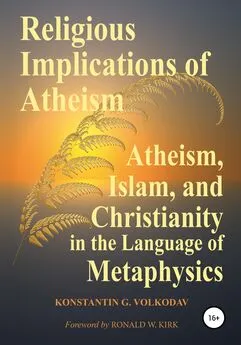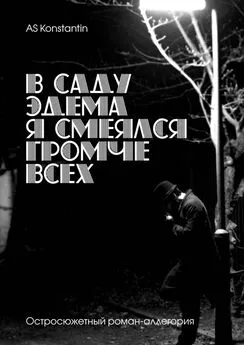Konstantin Volkodav - Religious Implications of Atheism
- Название:Religious Implications of Atheism
- Автор:
- Жанр:
- Издательство:неизвестно
- Год:2021
- ISBN:978-5-532-95383-3
- Рейтинг:
- Избранное:Добавить в избранное
-
Отзывы:
-
Ваша оценка:
Konstantin Volkodav - Religious Implications of Atheism краткое содержание
Religious Implications of Atheism - читать онлайн бесплатно ознакомительный отрывок
Интервал:
Закладка:
While religion is a socio-cultural phenomenon, in Christianity God looks at the heart, addresses the depths of the personality of each person individually. Sometimes He asks provocative questions or even gives provocative commandments to see the response of a person’s soul. For example, when Christ said to Judas, “Do quickly what you are going to do” (John 13:27), he did not want to push Judas to betrayal, but on the contrary, he wanted his conscience to awaken in him. And when Jesus said to the twelve apostles, “Do you also wish to go away?” (John 6:67) he certainly did not push them away. Does God look wherever the heart of a human bows, for good or for evil?
In the Old Testament, many religious ordinances were given. For example, about the Sabbath or the fact that harlots should be stoned. But Christ did not condemn the harlot whom they wanted to stone (John 8:11) and often provocatively violated the Sabbath in front of Jewish religious leaders. They were indignant at him, and he was at them, saying, “Is it lawful to do good or to do harm on the sabbath, to save life or to kill?” (Mark 3:4) God, as it were, provokes people: will you fulfill a religious commandment if it will lead to evil, or will you break a religious commandment if it will lead to good? Perhaps, the Old Testament commandment to destroy seven nations in the land of Canaan was just as provocative: do you want to become executioners?
Thus, it can be sayed that Christianity is a paradox that is above religion and transfigurate religion. And if one tries to explain Christianity rationally, logically, its meaning, so to speak, for atheists, then its most basic core, its essence, its paradoxicality will inevitably be lost. It is logically inexplicable. Myths and legends of different peoples, no matter how fantastic they are, in any case contain traces of human psychology, elements of human logic. In Christianity, at its core, this is not the case. It is impossible to invent it. In it, at every point, there is a paradox and a contradiction to human common sense. Even the chosen apostles did not understand it at first. The former persecutor of Christians, the apostle Paul, labored more than them in the preaching of Christianity. And this is also a paradox.
Paradoxical and Orthodox Christianity
After the second century, Christianity began to divide, split into orthodox and heterodox. But both of them began to lose (not in theory, but in practice) the Christian paradoxicality. Of what the paradoxicality? When the ruler is like a servant, when Christians have everything (property) in common and they seem to have one heart and one soul (Acts 4:32) and love for one another (John 13:35), not a human for the sabbath (or the tradition of the elders), but sabbath for a human (Mark 2:27), etc.
Paradoxia (as opposed to orthodoxy or heterodoxia) is like the calcium in bones, which gives them strength. If the calcium is washed out of the bones, the bones break easily. Likewise, in Christianity, with a lack of practical paradoxia, it becomes fragile. It is no accident that atheism developed, first of all, in Christian countries.
The antonym of paradoxicality is orthodoxy—proven, traditional. “Orthodox” literally means “following the dominant tradition.” Paradoxicality and orthodoxy are two opposite paths. The first corresponds more to Christianity, and the second to paganism. The source of all the differences between them is the opposite attitude towards God and the spiritual world in general.
According to the Christian concept, God creates a human in his own image and likeness, i. e. in the act of creation the potential possibility of overcoming the ontological and spiritual abyss between the created and the uncreated is laid. The connection of the Creator with the creation can be so close that even the Incarnation of God in definitive and final form in Christ took place, i. e. real union of God with human nature. God believes in human and is ready to accept even death on the Cross for human sake. He encourages a human to establish a relationship of mutual love (characterized by freedom, selflessness and self-giving). These are relations of free individuals that cannot be subordinated to any formal scheme.
On the contrary, paganism is characterized by the fundamental ontological and spiritual alienation of human from any deities. The ancient Greek philosopher Epicurus said that the gods would never agree to accept a real human body. Even the material body of a human was considered by the pagans as a punishment, as a prison of the soul. Similar views were also in Hinduism, where deities took only ghostly forms (avatars), not uniting with matter in reality. Thus, a human seems to withdraw into himself, because the gap between him and the deities is insurmountable in principle. In addition, paganism seeks the possibility of either protecting a man from deities, or gaining their patronage for ‘a bribe’ (an offering), or by using some magical action to make the deities serve humans. The ideal of paganism is to “catch God” and make him fulfill the desires of man. To achieve this goal, a special religious system of methods, means and ways is being developed. Therefore in paganism “orthodoxy” is very much appreciated, that is, understandable logical explanations and formal schemes, the ability to achieve the desired result by simply following a known well-technique.
That is why the Gentiles of different countries and nations easily understood each other, because the psychology of idolatry was almost the same everywhere. In the Roman Empire, Babylon and Egypt the profession of non-local religions by foreigners was tolerated, provided that they honor traditional local (state) gods. Only Christianity was persecuted everywhere, because from the point of view of the Gentiles it undermined the fundamental principles of any religion. Indeed, the New Testament says that the religious worldview (in the pagan sense) is fundamentally wrong.
But unfortunately, in historical Christianity the pagan approach and the Christian actually coexist in parallel. This is not surprising, because the Old Testament also abounds with examples of the facts that, despite all the divine revelations, people often inclined to paganism. This is a very big and important topic. For brevity, we confine ourselves to only three aspects: views on theology, worship, and the organization of the believers’ community (the Church).
Firstly, the intellectual cognition of the mysteries of the reality does not necessarily lead to understanding the mystery of God himself. If we cognize the material world by the methods of science and philosophy, then this will only lead to other questions. But a purely logical conclusion about the existence of God is not enough for the Christian faith in him. If an atheist loses in a dispute with some very clever believer and will be forced to recognize correctness of Christianity, the logically correct conclusions will not let him touch the reality of God and to go through any religious experience. This phenomenon is practically non-formalizable. A human can only feel that he knows about God personally, from his own experience, but not by hearsay, not by logical evidences, not forced by any authority.
In Judaism (Old Testament prophets), Christianity, and Islam, the knowledge of God is spoken of in terms of “daath Elohim” (Heb. אֱלהִים «Elohim», Strong’s lexicon number 430, דַּעַת «daath», Strong’s lexicon number 1847, cf. Hos. 4:1) [48] . Strong’s Exhaustive Concordance. https://biblehub.com/englishmans_hebrew.htm
, denoting the highest destiny of human, the meaning and purpose of his life. This is not theoretical (theological) knowledge, but spiritual closeness achieved through love for God and the fulfillment of his commandments. The meeting of the saints with God is described in the Bible as a meeting of two free personalities.
This is probably the key problem of atheism. Atheists take a rational-speculative path, in which they obviously cannot meet God. However, the same problem can apply to religious people if their hearts are not sincerely turned to God (Matt. 15:8; Mark 7:6).
And yet it is necessary to emphasize another property of theological calculations—these are just models collected from the data of Revelation. Between the formulated truth and reality there is a link, but not an identity.
Therefore, Christians seek a meeting with God and stand before the mystery of God, and not before the knowledge of him, accumulated by many generations in the past centuries. It is necessary to distinguish the partial Revelation from the fullness of what is still offered to our knowledge, from the vision of God himself. St. Gregory the Theologian in the fourth century said about this, that if we could collect all the data of the Revelation and create from them the most rich and full image of God, if at this moment we foolishly say, “Here is our God,” we would create an idol that closes the vision of the true God, instead of creating a transparent image that would allow us to see through it a reality that is more and more superior to it. [49] . Quoted from: Антоний Блум (Митр. Сурожский), Труды . Кн. 1, 361.
In addition, one should take into account the fact that even the holy fathers are not immune from intellectual errors. The famous patrologist Fr. George Florovsky said, that there is not one father of the Church, except St. Gregory the Theologian, who cannot find any not entirely correct statements. At the St. Gregory the Theologian, they are not only because he was too cautious in his writings. [50] . Quoted from: Антоний Блум (Митр. Сурожский), Труды . Кн. 1, 295.
Therefore it is necessary to evince wisdom and courage and not try to build an imaginary presence of God to fill the horrible emptiness of his absence.
In those countries where Christianity enjoyed the support of the state, attempts to preach it with purely intellectual methods were typical, with the help of the authority of theology. But this approach does not always lead to the desired results. Suffice it to recall that in the atheistic revolution of 1917 in Russia numerous graduates of Orthodox educational institutions took an active part.
Secondly, the liturgical aspect should be noted. Before the beginning of the Liturgy, the most important Christian worship, the deacon tells to the priest very important words, “It is time for the Lord to act”. [51] . http://www.saintjonah.org/services/proskomede.doc
By that time, the Office of Oblation (Proskomide), the preparatory part of the Liturgy, has already been performed, and these words serve as a reminder to the priest that all his further movements and prayers cannot accomplish anything: the time has come when only the Lord will act. In Christianity there is no magic, there is no other High Priest except Christ, and there is no power other than the power of the Holy Spirit. No human effort, words and tricks can transform earthly into heavenly. God cannot be forced to commit something. He responds only to invoking him with a pure heart, that is, when the thoughts of human are pure from all that is unworthy of love. However, in his immeasurable love he descends to sinful people, not forced by anyone, like a father to disobedient children.
In this sense, Christianity really is the end of religion, that is, the end of the system of rituals, prayers, incantations, spells and other tricks in order to force or at least convince God to approach people. None of this is required. The paradox of Christianity is that God became human and through his Incarnation invisible became visible, the imperceptible became tangible, inaccessible became available. There is no rite, ritual or spell that can add or subtract anything to that.
Читать дальшеИнтервал:
Закладка:

![Константин Бальмонт - Константин Бальмонт и поэзия французского языка/Konstantin Balmont et la poésie de langue française [билингва ru-fr]](/books/613502/konstantin-balmont-konstantin-balmont-i-poeziya-frantsuzskogo-yazyka-konstantin-balmont-et-la-po-sie-de-langue-fran-aise-bilingva-ru-fr.webp)






